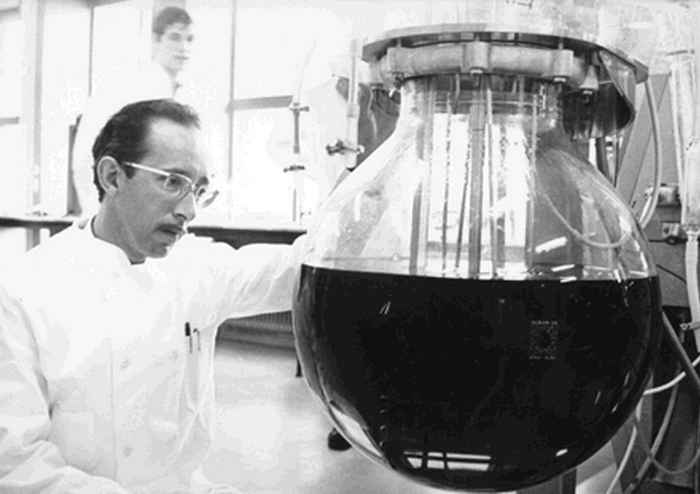How do we explain mistrust of the corona vaccine?
Interview with Stuart Blume, Emeritus Professor Science & Technology Studies
9 December 2020

Stuart Blume is professor emeritus of Science & Technology Studies, and his research looks through a historical lens to examine how and why specific vaccines were developed in the Netherlands (such as those for polio, whooping cough and measles), why some vaccines have become controversial and, in collaboration with international colleagues, how globalisation has impacted vaccine development and production worldwide.
Vaccines have become controversial
‘By comparing historical studies of different vaccines, I was able to look at what changed,’ Blume explains. ‘And my prediction has come true – namely, that vaccines would become controversial.’ While the resistance to vaccinations has been growing for quite some time, it is now clearly visible in the 40% of the Dutch population that, according to various surveys, does not want to get vaccinated against COVID-19. ‘You always have to take this kind of survey with a grain of salt’, Blume warns. ‘There’s a difference between saying something and doing something, after all, but it’s still a very high number.’ To illustrate, he points out that few people opposed vaccination programmes for whooping cough and measles years ago. They were mainly strict Calvinists.
Blume sees three historical developments as possible explanations for the growing mistrust.
We expect too much from vaccines
The growing resistance to vaccines is partly due to unrealistic expectations, according to Blume. ‘A vaccine is increasingly seen as the definitive answer to a disease, which has made us heavily dependent on vaccines for dealing with the problem of infectious diseases. As a result, several new vaccines have been introduced in recent years. With polio especially, it was quite clear to the population how badly a vaccine was needed, since that disease had such serious consequences. But with the swine flu, for example, people started to wonder whether the recommended vaccine was really necessary, and they became more sceptical’, Blume says.

Vaccine production has changed
As a second reason for the growing mistrust towards vaccines, Blume cites the changes in vaccine production. ‘The government no longer makes the vaccines for its vaccination programme itself. Instead, these are now produced by international pharmaceutical companies whose production lines are spread across the globe.’
For decades, vaccine production was a task of the Bilthoven-based RIV (National Institute for Public Health), which later became RIVM (National Institute for Public Health and the Environment). In 2012, however, the Dutch government sold the manufacturing arm to a company in India. As a result, RIVM would only be responsible for the purchase, storage and distribution of vaccines. ‘This raises questions about accountability and where the vaccine actually comes from’, Blume says. ‘The system has become less transparent. Some people even suspect Bill Gates of having spread the coronavirus in order to further his own agenda and promote vaccines for his own gain. People don’t really know who is in control of what anymore, which is how such wild ideas can crop up.’
The rise of right-wing populism
According to Blume, the political climate and the rise of right-wing populism have also played a role in the growing mistrust towards vaccines. Right-wing populism has capitalised on this mistrust, created even more doubts and further fuelled the uncertainty. ‘Radical right-wing parties cast doubt on scientific studies and institutes and go along with conspiracy theories about the current elite who are supposedly lying about the virus and vaccines’, Blume explains.
How can vaccine acceptance be increased?
Blume sees a major difference between how vaccines are introduced now versus in the past. ‘Forty years ago, public debate was an important way for the government to gauge acceptance before introducing a vaccine. In recent years, international pressure on the government has increased significantly, and there seems to be hardly any room for such social debate, which can play a key role in vaccine acceptance.’ At the same time, Blume says this is currently understandable given the unprecedented situation we find ourselves in. ‘But that doesn’t change the fact that transparency about the vaccine – including liability contracts – is important for acceptance.'
We are in an unprecedented situation
It is clear that we are in the midst of an unprecedented situation. ‘There are now 200 vaccines in development. This means many more will become available if multiple vaccines are approved.’ Blume finds it striking that we hear a lot about the vaccines from Pfizer, Moderna and AstraZeneca but hardly anything about the vaccines which have been developed in Russia and China, even though these vaccines are already being rolled out on a large scale. As Blume wrote in The New York Times when vaccine development was at an early stage: ‘This is not just about saving lives. It is also about power, profit and national prestige. You could compare it to the space race: who will be the first to have a vaccine?’
And once the vaccine is ready, will that solve everything?
‘When governments start approving coronavirus vaccines, as the UK has just done, that’s just the beginning’, Blume says. ‘How do you ensure that everyone has access? How do you prevent poorer countries from falling behind? What do we do if there are side effects? Who would be liable? This may not be an issue here in the Netherlands, since we all have health insurance, but what about someone in the US who is uninsured? Who will pay for the possible extra costs?’
Blume is ultimately less concerned about people’s willingness to get vaccinated. ‘In the Netherlands, this problem will resolve on its own. We won't all get vaccinated at the same time, so people can wait a bit and see what happens. If all goes well, it will put our minds at ease. The vaccination rate for the HPV vaccine against cervical cancer shows us that time can play a role as well. After a difficult start in The Netherlands, the vaccination rate has increased in the past few years. Girls and their parents have got used to the idea, and nothing serious seems to have happened here.’
Further reading
- Stuart Blume (2020), Get Ready for the Global Fight Over Vaccines (OpEd in The New York Times)
- Stuart Blume (2017), Immunization: How Vaccines Became Controversial (Reaktion Books)
- Stuart Blume, and Ingrid Geesink (2000), A Brief History of Polio Vaccines
- Stuart Blume and Maurizia Mezza (2020) What When There’s a Vaccine? https://www.socialeurope.eu/what-when-theres-a-vaccine